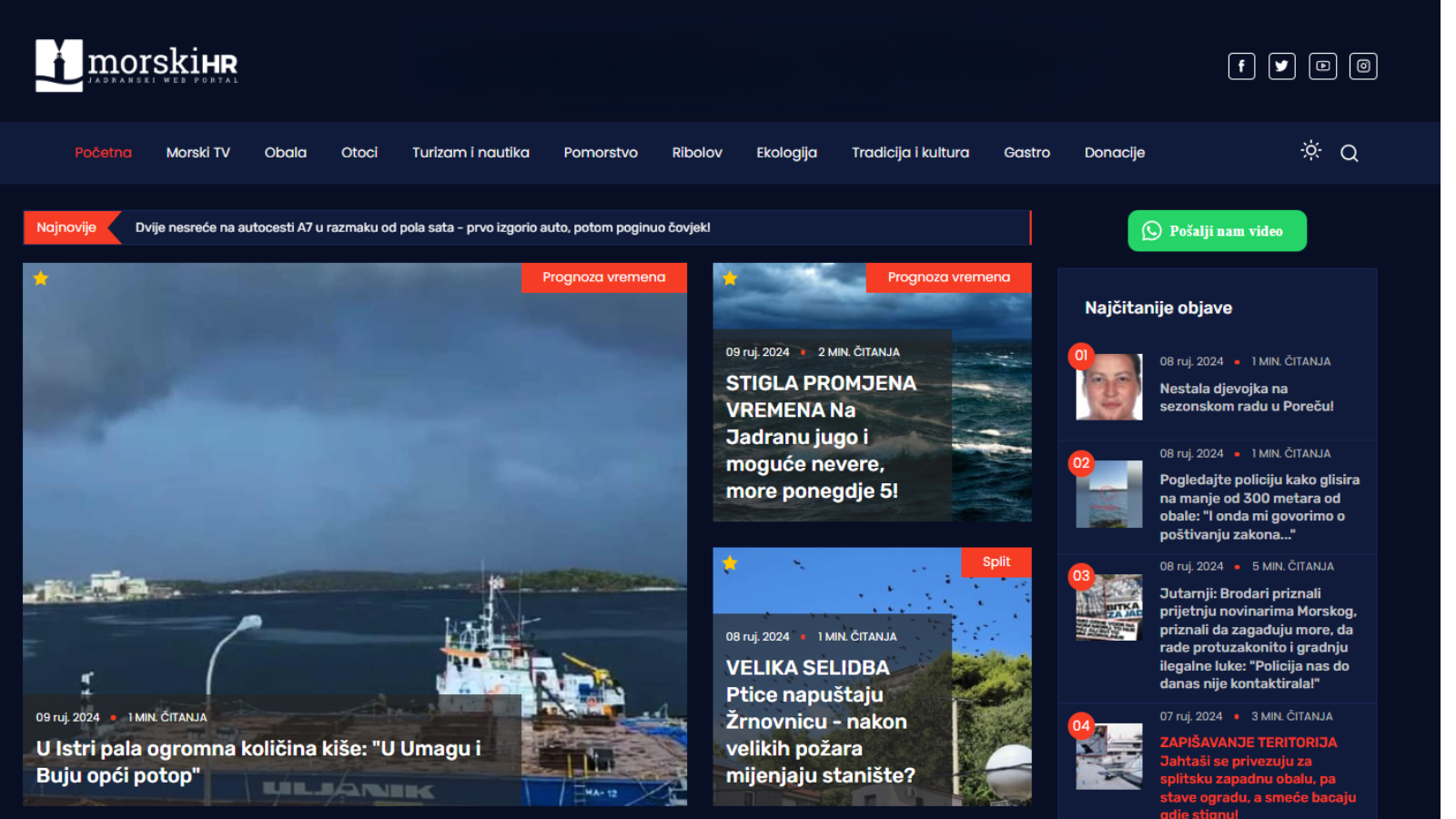
morski.hr. - screenshot
Media campaigns and even kidnapping threats to marginalise and silence an inconvenient media outlet: this is what is happening in Croatia to the maritime affairs website "morski.hr", an episode that reopens concerns about freedom of the press in the country
A serious attack – which betrays a worrying modus operandi – has involved the Croatian website specialised in maritime affairs morski.hr in recent days.
According to a recording published on September 1 by the portal itself, the Croatian Association of Private Shipowners (HUPB), unnerved by some critical articles that appeared on the site, allegedly hired a public relations firm with the aim of “marginalising” the work of journalists, while some of the HUPB members even proposed kidnapping the editor-in-chief of morski.hr, Jurica Gašpar.
The reaction of press freedom organisations was immediate: the Croatian Association of Journalists (HND ) denounced “serious threats” and asked the police to investigate and arrest those responsible, while the European Federation of Journalists (EFJ) spoke of “unacceptable threats” that deserve to be treated seriously.
100,000 Euros to marginalise an information portal
The recording published on Sunday, September 1 by morski.hr, is beyond belief. Sitting around a table are several representatives of the Croatian Association of Private Shipowners (HUPB), a legal expert on maritime issues and the director of the PR agency IMC Ankica Mamić, a well-known figure in Croatia, as she is often invited as a political analyst by Croatian television.
In the audio, which lasts about half an hour, those present discuss what strategy to adopt to counter the negative writings on morski.hr against HUPB. At one point, the marketing expert suggests using her alleged acquaintance with the Minister of Tourism and Deputy Prime Minister Branko Bačić to create a positive image of shipping and “reduce Morski to what it is, a marginal portal”, Mamić concludes.
According to the portal, HUPB paid Mamić’s IMC agency 100,000 Euros for its services. “Especially interesting”, comments the Croatian Journalists Association (HND), “is the part where the PR expert tells, as she puts it, the positive stories of her clients, saying among other things: ‘We need to involve the Minister of Tourism in this story, we will definitely involve him, and we will start writing positive stories, about what you are doing well, and thus we will reduce Morski to what it is, a marginal portal’.
For the HND, such agreements are ludicrous, and the part where [Ankica Mamić, ed.] basically says that a portal should be marginalised is especially unacceptable.
The ministers mentioned by the marketing expert have denied any involvement, but the HND warns that “PR agreements with ministers and other government representatives to influence the media are a long-standing and highly controversial practice”.
The Croatian Journalists Association recalls that it has long warned against the widespread practice whereby “various PR agencies create content through the media and in cooperation with various ministries and public authorities”, content “that is not in the public interest and as such is an enemy of journalism”.
In Croatia, PR agencies “have gone beyond their scope of competence”, “they are no longer just spokespeople for their clients, but actively participate in their corporate policies, and if on their way to such policies they encounter media that write differently, then, as in this case, they try to marginalise them”.
“Someone put him in the trunk”
However, the agreement that emerges from the recording published by morski.hr is not the most serious aspect of the affair. In a WhatsApp group called “Adriatic Shipowners” – a group within HUPB – one person proposed kidnapping the portal’s editor-in-chief, Jurica Gašpar.
“Here, Cesarica (name of the boat), I am ready to pay – and I ask everyone to give – 100 Euros, so that someone puts that idiot Morski.hr in the trunk of his car”. Other messages on the same topic followed.
According to Gašpar himself, who had access to the conversation, one of the group’s participants responded that the journalist “should be taken by ferry to Brač and left naked on Vidova Gora [the highest peak on the island, ed.]”. Ten members of the group agreed.
Gašpar told the European Federation of Journalists (EFJ) that, although he had received threats from shipping companies in the past for his critical articles, this was the first time he had been threatened with kidnapping.
The president of the Croatian Association of Private Shipowners, Arsen Ercegović, condemned these messages, but the episode nevertheless shows the climate of hatred that Croatian journalists, especially those who cover local economic interests, often have to deal with.
As Reporters Sans Frontières (RSF) notes, “although there have been no murders of journalists [in Croatia, ed.] since 2008, physical attacks and intimidation against journalists occur every year”.
“Working as a journalist in Croatia can be dangerous”, RSF continues. “Reporters who investigate corruption, organised crime or war crimes, especially at the local level, are often victims of harassment campaigns. Physical attacks, threats and cyber-violence are a major problem, with little response from the authorities”.
Unfortunately, after the case was published, Jurica Gašpar received new threats , this time death threats.
On September 9, the Media Freedom Rapid Response (MFRR) consortium began a mission on press freedom in Croatia. The delegation will meet online with government representatives, journalists and journalist associations, civil society and media experts to discuss the most pressing challenges to media freedom and pluralism in the country.
This article was produced by OBC Transeuropa within the Media Freedom Rapid Response (MFRR) project, a Europe-wide mechanism that tracks, monitors and responds to violations of press and media freedom in EU Member States and candidate countries.























 To Top
To Top